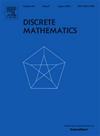组块大小为 4、组块大小为 4 和 10 的可分设计,以及其他一些 4-GDD 设计
IF 0.7
3区 数学
Q2 MATHEMATICS
引用次数: 0
摘要
在本文中,我们考虑了块大小为 4、组大小为 4 和 10 的组可分割设计(GDD)的存在性。我们证明,在满足必要条件的情况下,4t10s 类型的 4-GDD 是存在的,4t+10s≤178 的有限个例除外。我们还给出了一些点数为 51、54 或小于等于 50 的 4-GDD 的新例子。本文章由计算机程序翻译,如有差异,请以英文原文为准。
Group divisible designs with block size 4 and group sizes 4 and 10 and some other 4-GDDs
In this paper, we consider the existence of group divisible designs (GDDs) with block size 4 and group sizes 4 and 10. We show that a 4-GDD of type exists when the necessary conditions are satisfied, except possibly for a finite number of cases with . We also give some new examples of 4-GDDs for which the number of points is 51, 54 or some value less than or equal to 50.
求助全文
通过发布文献求助,成功后即可免费获取论文全文。
去求助
来源期刊

Discrete Mathematics
数学-数学
CiteScore
1.50
自引率
12.50%
发文量
424
审稿时长
6 months
期刊介绍:
Discrete Mathematics provides a common forum for significant research in many areas of discrete mathematics and combinatorics. Among the fields covered by Discrete Mathematics are graph and hypergraph theory, enumeration, coding theory, block designs, the combinatorics of partially ordered sets, extremal set theory, matroid theory, algebraic combinatorics, discrete geometry, matrices, and discrete probability theory.
Items in the journal include research articles (Contributions or Notes, depending on length) and survey/expository articles (Perspectives). Efforts are made to process the submission of Notes (short articles) quickly. The Perspectives section features expository articles accessible to a broad audience that cast new light or present unifying points of view on well-known or insufficiently-known topics.
 求助内容:
求助内容: 应助结果提醒方式:
应助结果提醒方式:


